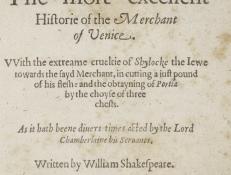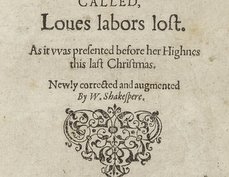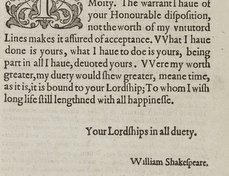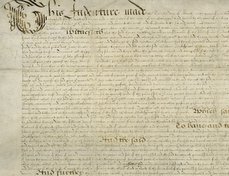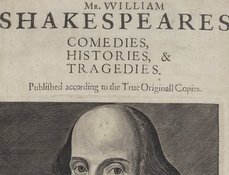Terms of use
The Worshipful Company of Stationers and Newspaper Makers has graciously contributed the above image from their collections to Shakespeare Documented under a Creative Commons Attribution-NonCommercial 4.0 International license. For any further use, visitors should contact the Clerk of the Worshipful Company of Stationers and Newspaper Makers at clerk@stationers.org.
Document-specific information
Creator: Worshipful Company of Stationers and Newspaper Makers
Title: Liber C
Date: 1595-1620
Repository: Worshipful Company of Stationers and Newspaper Makers, London, UK
Call number and opening: Liber C, fol. 39v
Folger Shakespeare Library staff, "Stationers' Register entry for The Merchant of Venice," Shakespeare Documented, https://doi.org/10.37078/401.
The Worshipful Company of Stationers and Newspaper Makers, Liber C, folio 39 verso. See Shakespeare Documented, https://doi.org/10.37078/401.
The Merchant of Venice was entered into Liber C of the Stationers' Company on July 22, 1598, under "the title the Marchaunt of Venyce or otherwise called the Jewe of Venyce." James Roberts, the London printer and publisher who entered the title, was allowed to enter the play under the restriction that any printing had to be authorized by the Lord Chamberlain. Roberts' rights to the play were transferred to Thomas Hayes on October 28 of that same year, and Roberts produced the first quarto edition in 1600, to be sold by Hayes. A total of only three quarto editions were produced before 1642; the play was included in the First and Second Folios.
Liber C and the other registers with Shakespeare’s works are still kept by the Stationers’ Company in their archives.
[This transcription is pending final vetting]
[Current transcription based on Arber; check back soon for a transcription that conforms to Shakespeare Documented conventions]
1598 Anno 40mo Regine Elizabeth
xxijo Julij
James Robertes./ Entred for his copie vnder the handes
of bothe the wardens, a booke
of the Marchaunt of Venyce
or otherwise called the Jewe
of Venyce / Prouided that
yt bee not prynted by the said James
Robertes or anye other whatsoeuer
without lycence first had from the
Right honorable the lord Chamberlen. . . . vjd
John Browne / Entred for his Copie vnder the handes of
mr Lyllye and mr warden Ponsonbye
a booke intituled / A most fragrant
flower or devoute exposition of the Lordes
prayer, full od godlye effectes, and
Deuided into Seaven meditations or
prayers, Compiled by Granado
a ffryer and translated out of the Latyn
in to Englishe by J / G. . . . . . vjd
7 Augusti
Tho. East Entred for his copies these thinges
flowinge viz
1 The first sett of English madrigalles
to. 3. 4. 5. and 6. voices compiled
by John Wilby . . . . vjd
2 Madrigalles to ffyve voices selected out
of the best approued Italian Authours
by Tho. Morley gent of her maiesties
Roiall Chappell . . . vjd
3 Nove aliquot non antehac ita vsitate
ad duas voces Cantiones suauissime
omnibus musicis summe vtiles &c
Authore Orlando di Lasso DI LASSO &c . . . . . vjd
4 Ballettes and Madrigalles to ffyve voices
with one to 6 voices newly published
By Tho Weelkes . vjd
Sources
Edward Arber, ed. A Transcript of the Registers of the Company of Stationers of London: 1554–1640 A.D. 5 vols. (London: privately printed, 1875–94), 3:122.
DEEP: Database of Early English Playbooks, "The Merchant of Venice (The Jew of Venice)," Ed. Alan B. Farmer and Zachary Lesser. Created 2007. Accessed 15 January 2016. http://deep.sas.upenn.edu.
Martin Wiggins and Catherine Richardson, "1047. The Merchant of Venice," in British Drama, 1533-1642: A Catalogue. Vol. 3, 1590-1597, (Oxford: Oxford University Press, 2013), 341-46.
Last updated February 8, 2020



